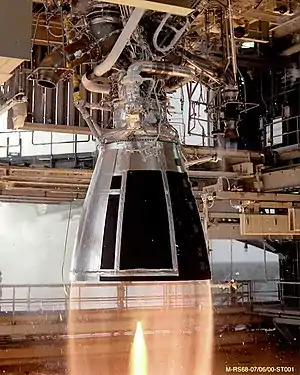RD-0410 (РД-0410, GRAU index: 11B91) was a Soviet nuclear thermal rocket engine developed by the Chemical Automatics Design Bureau[1] in Voronezh from 1965 through the 1980s using liquid hydrogen propellant.[2] The engine was ground-tested at the Semipalatinsk Test Site,[3] and its use was incorporated in the Kurchatov Mars 1994 crewed mission proposal.[2]
This engine had slightly higher performance (exhaust temperature and specific impulse) over NERVA (the U.S. nuclear thermal rocket engine project). The design of the reactor core included thermal insulation between uranium carbide/tungsten carbide fuel and the zirconium hydride moderator. This allowed for a very compact reactor core design. Hydrogen flow cooled the moderator first allowing to keep very low neutron energy and high fission cross-section, then it was heated by the direct contact to the fuel rods. To prevent the chemical reaction between carbide and hydrogen, about 1 percent of hexane was added to the hydrogen after the moderator passage.[4]
The hydrogen boost turbopump was designed by KBKhA in Voronezh.[5]
See also
References
- ↑ "Ядерный ракетный двигатель РД0410 (РД0411) | АО «Конструкторское Бюро Химавтоматики»".
- 1 2 Wade, Mark. "RD-0410". Encyclopedia Astronautica. Archived from the original on 2009-04-08. Retrieved 2009-09-25.
- ↑ ""Konstruktorskoe Buro Khimavtomatiky" - Scientific-Research Complex / RD0410. Nuclear Rocket Engine. Advanced launch vehicles". KBKhA - Chemical Automatics Design Bureau. Retrieved 2009-09-25.
- ↑ http://www.k204.ru/books/Aviadvigatel2.pdf
- ↑ Demyanenko, Y.; A. Dmitrenko; A. Ivanov; V. Pershin; et al. (July 2005). "Ground Test Demonstrator Engine Boost Turbopumps Design and Development" (PDF). 41st AIAA/ASME/SAE/ASEE Joint Propulsion Conference & Exhibit. Tucson, Arizona: American Institute of Aeronautics and Astronautics, Inc. Retrieved 2012-08-21.
Further reading
- Soviet Mars Propulsion - Nuclear Thermal astronautix.com
- Popular Mechanics article in Russian
- Russian article
- Russian video about RD-0410 Rocket (Russian)
